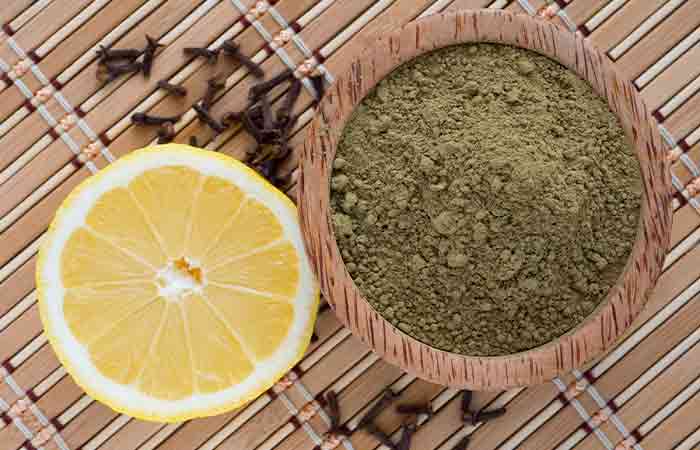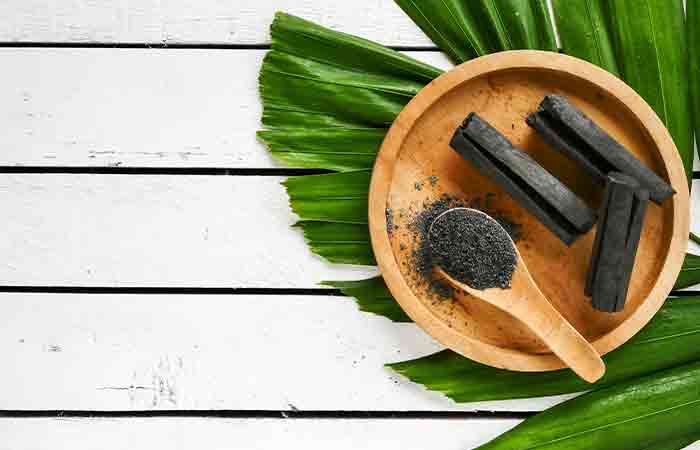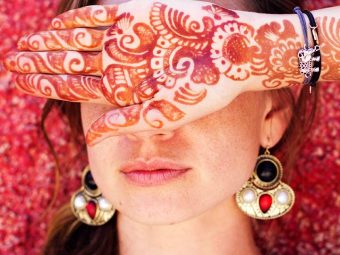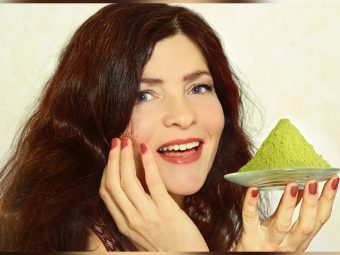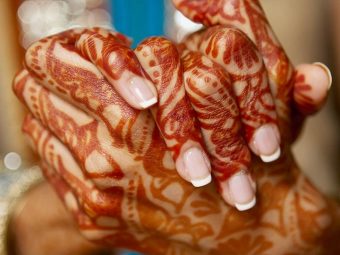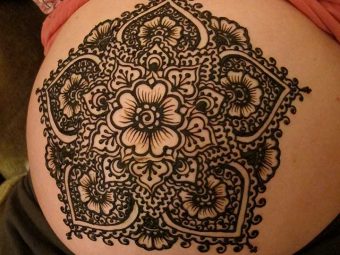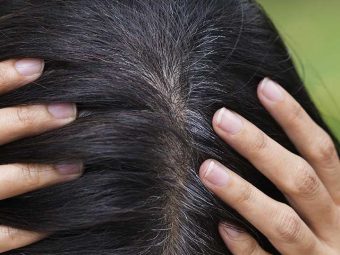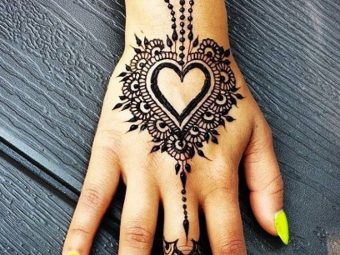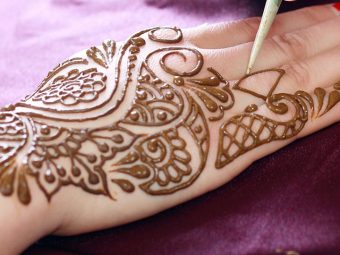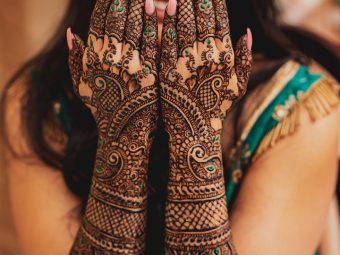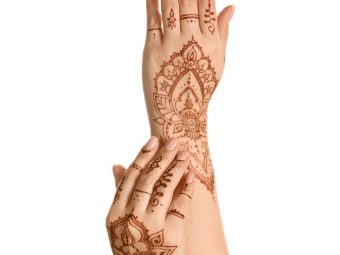Simple Tips To Darken Mehendi And Make It Long-Lasting
Let your mehendi color stand out in the crowd with these easy and effective tips.
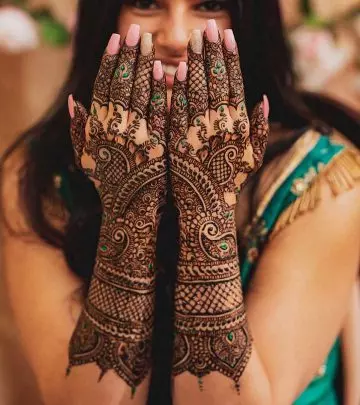
Image: Shutterstock
Henna or mehendi has been used as a dye to color the skin, hair, and clothes for centuries (1). It is used for body art in Arabia (the Arabian peninsula), ancient Persia (modern Iran) and Mesopotamia (parts of present-day Iran, Iraq, Syria, and Turkey), Tunisia, Africa, and India and is a part of Hindu and Islamic cultures. Henna or mehendi is a part of wedding rituals and is said to bring prosperity to newlyweds. It is believed that the darker the stain, the deeper the bond. That is one reason brides are keener to get a brilliant and dark mehendi stain. If you want to know the tips and tricks to make your mehendi dark and long-lasting, this article explains how you can do that. Keep reading to know the dos and don’ts of applying mehendi.
 Keep In Mind
Keep In Mind- Exfoliate Your Skin: Exfoliate Your Skin Exfoliation helps remove dead skin cells and helps the henna stick to your skin better.
- Use Stencils: Exfoliate Your Skin Use stencils to create perfect designs if you are a beginner or short on time. Place the stencil on your skin and apply henna over it.
- Avoid: Exfoliate Your Skin To prevent smudging, avoid activities that can make you excessively sweat in the first few days after applying henna.
- Hairstyle: Exfoliate Your Skin Braided updo, top knot, messy bun, high ponytail are some of the best choices.
- Outfit: Exfoliate Your Skin Lehenga choli, anarkali suit, salwar kameez, saree, sharara are some of the best outfit ideas that go well with mehendi.
In This Article
Why Does Mehendi Turn Black?
Initially, after application, the mehendi color appears light. But it darkens as you leave it on for a longer time. It is because of the pigment called lawsone. It bonds with the skin cells, collageni XA natural protein produced in the connective tissues, providing a structural framework for the skin and making it elastic. , and keratini XA protein in the human body that keeps nails and hair healthy and shiny, supports the outer layer of the skin, and heals skin wounds. (in nails and hair) to give a dark brown-black color (2).
There are three types of henna (3):
- Red Henna: It gives an orangish-brown and reddish-brown tint to the skin.
- Neutral Henna: It does not have any color.
- Black Henna: It dyes the skin black.
Black henna combines regular henna and PPD or para-phenylenediamine, a type of coal-tar dye. It is often mixed with henna for temporary black body art tattoos and skin painting. PPD is a contact allergen, and hence, it is advised to avoid using black henna (4), (5). Some readymade store-bought henna packs may contain ingredients like indigo and lime to darken the mehendi shade and make it last longer. You may try the following ways to darken mehendi so it lasts longer.
How To Darken Mehendi
- Time: Leave the henna on your skin for a longer time. This helps it turn darker.

- Use Heat: Applying heat can darken the mehndi (6). Use a blow dryer to heat the henna on your skin. However, make sure to maintain a safe distance and avoid exposing your skin to the heat for a long time.
- Use A Cling Wrap: Wrapping the area with a cling wrap traps the heat to intensify the color (6).
- Use Alkaline Ingredients: Mixing henna with alkalinei XAn alkaline solution causes the cuticles to swell and open, which allows color actives and dyes to enter deeper for a darker color result. or acidic ingredients can darken its color. Mix henna with pure lemon juice and apply to your skin to turn it darker (2), (6).
 Quick Tip
Quick Tip- Spices: Adding chili powder and mustard oil to henna gives it a darker shade (2). However, be careful of the amount of chili powder as excess powder may burn your skin. Add about a teaspoon of chili powder and a tablespoon or two mustard oil to henna.

- Essential Oils: Adding essential oils like lemon oil, eucalyptus oil, or clove oil can darken henna (1). You can also mix Mahalabiya oil (an essential oil with a pine oil base) to darken henna. Essential oils contain monoterpenesi XChemical compounds/group of alcohols present in the essential oils extracted from plant foods like citrus fruits, cherry, and spearmint that make hydrophobic compounds more available. , a group of alcohols often used to darken henna (6), (7).
- Coffee: Coffee naturally gives off a brownish tint. Adding coffee to your henna mix can enhance its darkness (1).
- Beetroot: Beetroot juice is used as a natural dye in cosmetics. It gives a deep pinkish-purple stain. You can add beetroot juice or beetroot powder to henna to enhance the color (1).
- Black Tea: Black tea contains tannini XA class of chemical compounds found in the parts of plants, like tea and chocolate, which possess antioxidant properties. concentrates that can darken henna (1). Brew some tea leaves with water, add the decoction to henna, and mix.
- Charcoal Powder: Charcoal has an ashy shade that can darken henna (1). Add a few teaspoons of charcoal powder to the henna before applying it to your hands.
- Sugar: Adding sugar to mehendi can intensify its color and make it last longer (1).
- Turpentine: Turpentine oil (pine resin distillate) can also darken mehendi and make it last longer (1).
You may use these ingredients to darken the mehendi mixture before application. However, if you are purchasing mehendi from the market, look for the following ingredients:
- Ammonia: Store-bought henna packets often contain ammonia as it darkens the pigmentation (6). Check the ingredients list before buying.
- Sodium Methylparaben: Look for mehendi that contains sodium methylparaben. This compound darkens the mehendi stain (2).
However, ammonia and sodium methylparabeni XA chemical compound used as a preservative in foods and sometimes also used in medicinal drugs and cosmetic products. may damage the skin. It is best to stick to natural options and avoid these chemicals.
Here are some pointers to help you enhance the color and longevity of mehndi.
Dos And Don’ts To Make Mehendi Last Longer
Dos
- Leave the mehendi on for about 2-6 hours to get an intense color.
- Once you wash off the henna, dip your hands in cold water for two minutes. Cold water closes the skin pores and may seal the color for a longer time.
- Massage the dried henna on your hands with oil and let it soak. This gives deep and strong color.
- Cover the area of application when going out in the sun. Sun exposure may lighten the mehendi.
 Quick Tip
Quick TipDonts
- Avoid moisture exposure, and keep the henna on your hands or other body parts dry for as long as you can. This helps enhance its color.
- Do not wash the henna off your hands with soap, as it may fade the mehendi. Use cold water to remove henna.
- Avoid using a hair dryer on a high heat setting to dry the mehendi. Use it on a low setting and keep it at a safe distance from your hands or feet. Holding the hair dryer too close to the area of application may cause color bleeding.
- Do not shave the area of application as it might scrape the top layer of the skin and affect the mehendi design.
- Do not apply skin-lightening products like skin bleach on the areas of application. This may fade the mehendi.
Follow these before and after-use henna tips to make your mehendi last longer. We have answered a few doubts that you may have in the following sections. Check them out.
How Long Should You Keep Mehendi On Your Hands?
Keep the mehendi for at least 2-6 hours. The longer you leave the henna on your skin, the stronger the color gets. Some women leave it overnight to obtain a dark shade of mehendi. However, be careful not to keep the mehndi for too long as it might turn black.
Does Vaseline Make Mehendi Darker?
Anecdotal evidence suggests that Vaseline might strengthen the color of mehendi. It traps the moisture and is water-resistant. As a result, it keeps the henna intact, allowing the color to seep into the skin. This may make the color last longer.
Does Coconut Oil Darken Mehendi?
Women traditionally use coconut oil to darken their mehendi design. It coats the application area and prevents moisture exposure, keeping the mehendi intact as it oxidizes. This helps intensify the color and make it last longer.
Infographic: Top 5 Natural Remedies To Darken Your Mehendi Design
Women feel the need to darken their mehendi design to make it bold and beautiful and so that it stays for a long time. It enhances the look of the OOTD in any event and the pictures turn out to be so good! We’ve picked the best aftercare remedies to darken mehendi from the elaborate list above. All of these ingredients can be found right in your kitchen and are easy to use.
Check out the infographic below to know the top 5 natural ingredients to darken your mehendi designs. Illustration: StyleCraze Design Team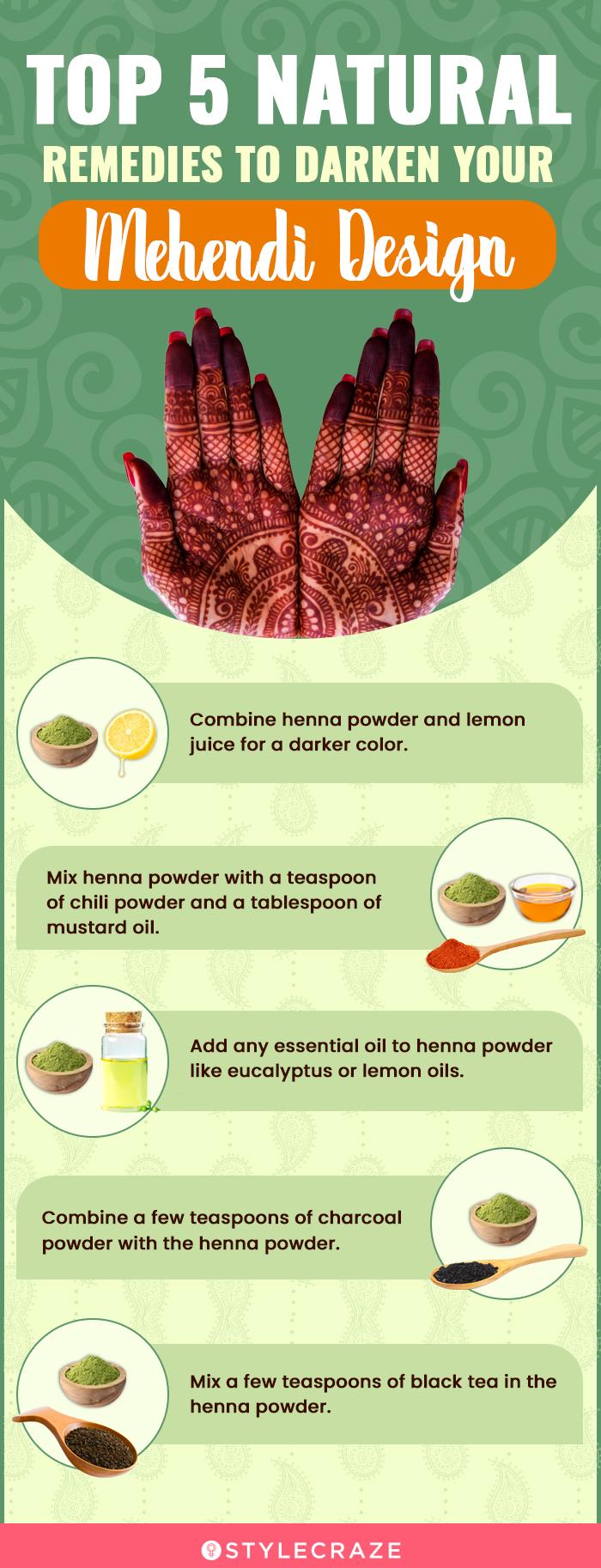
Mehendi or henna is a part of many cultures. In most traditions, the application of mehendi on a newlywed’s hands is a must. However, its beauty becomes manifold if it turns darker. People often ask how to darken mehendi after washing hands. Well, you can follow a few tips in this regard, like leaving it for a longer time, applying heat, using a cling wrap, and using the essential oils, coffee, beetroot, black tea, and charcoal powder to make it darker. To make it stay longer, avoid skin bleaching and washing henna with soap.
Frequently Asked Questions
Does olive oil darken henna?
Yes, olive oil may darken henna and make it long-lasting. You can apply it after scraping the henna paste off the skin.
Does Vicks make mehndi darker?
Yes, Vicks is known to make mehndi darker. The heat provided by it intensifies the shade.
Is it better to use natural or store-bought mehendi to make it darker?
Natural mehendi is better in terms of being long-lasting, natural in color, and safe from additives. Store-bought mehendi may stain quicker, but their chemicals may harm the skin.
Is it better to apply mehendi at night or during the day to make it darker?
Leaving the mehendi on the hands for 10-12 hours can make it dark, and this is more convenient to let it stay overnight. You can apply a lemon and sugar mixture or wrap your hands in cling film to keep the mehendi intact all night.
Can I use a specific type of mehendi cone to make the design darker?
Organic and pure henna cones made from natural henna powder are the best mehendi cones for dark color. Check the consistency of the henna in the cone, as a watered-down paste may fail to provide the desired stain.
Should I avoid using certain oils or lotions before or after applying mehendi to make it darker?
Do not apply any lotion or oil before applying the henna, as it will act as a barrier to pigment absorption. Avoid using oils or lotions on the design for at least 24 hours after removing the mehendi to prevent fading.
How long does it take for the mehendi to darken after removing it?
The henna stain may be orange while you remove it, gaining color over time. The shade darkens in 48-60 hours.
Key Takeaways
- Henna or mehendi is a part of South Asian wedding rituals, and it is said that the darker the color, the deeper the bond between the newlyweds.
- While store-bought henna contains ingredients like lime and indigo that help darken the shade, using certain spices, essential oils, and home ingredients can help you darken your henna.
- You can use Vaseline and coconut oil to help deepen the color of henna.
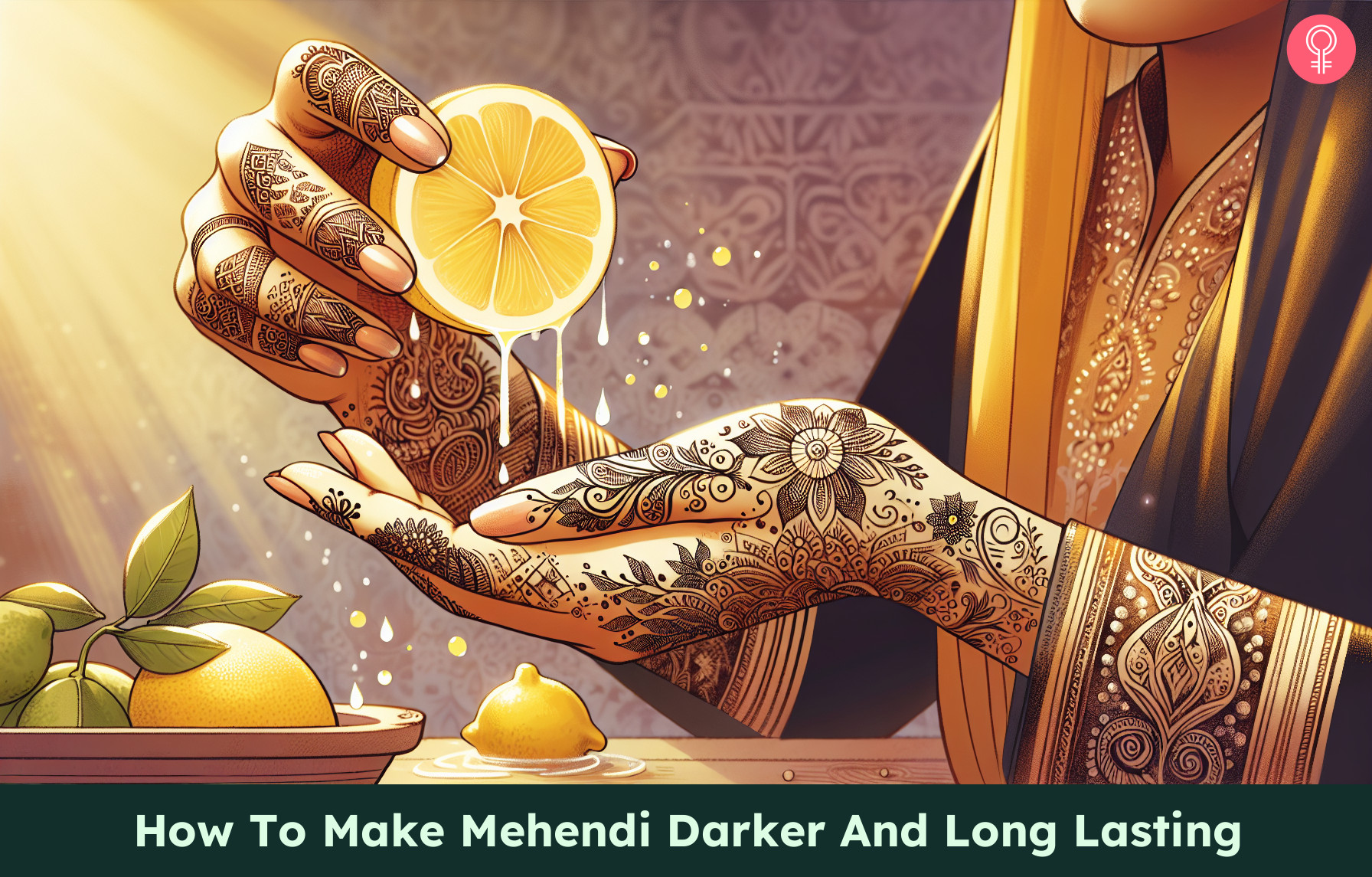
Image: Dall·E/StyleCraze Design Team
Achieve a darker henna stain like never before with this video! Learn the effective and proven techniques that ensure a rich, long-lasting color.
References
Articles on StyleCraze are backed by verified information from peer-reviewed and academic research papers, reputed organizations, research institutions, and medical associations to ensure accuracy and relevance. Read our editorial policy to learn more.
- Side effects Of Henna And Semi permanent black Henna Tattoos: A Full Review
https://onlinelibrary.wiley.com/doi/10.1111/cod.12074 - Retention Of Color Intensity Of Henna Paste During Storage
https://nopr.niscpr.res.in/bitstream/123456789/5654/1/NPR%207%282%29%20117-121.pdf - A Review Study Of Chemical Constituents And Side-Effects Of Black Henna For Children
https://www.researchgate.net/publication/303574371_A_Review_study_of_chemical_constituents_and_Side-effects_of_black_henna_for_Children - Skin Barrier Damage After Exposure To Paraphenylenediamine
https://www.jacionline.org/article/S0091-6749(19)31606-9/fulltext - Fact Sheet
https://www.fda.gov/cosmetics/cosmetic-products/temporary-tattoos-hennamehndi-and-black-henna-fact-sheet - Henna
https://www.researchgate.net/publication/280102197_Henna - Monoterpenes In Essential Oils
https://link.springer.com/chapter/10.1007/978-1-4615-4729-7_5





